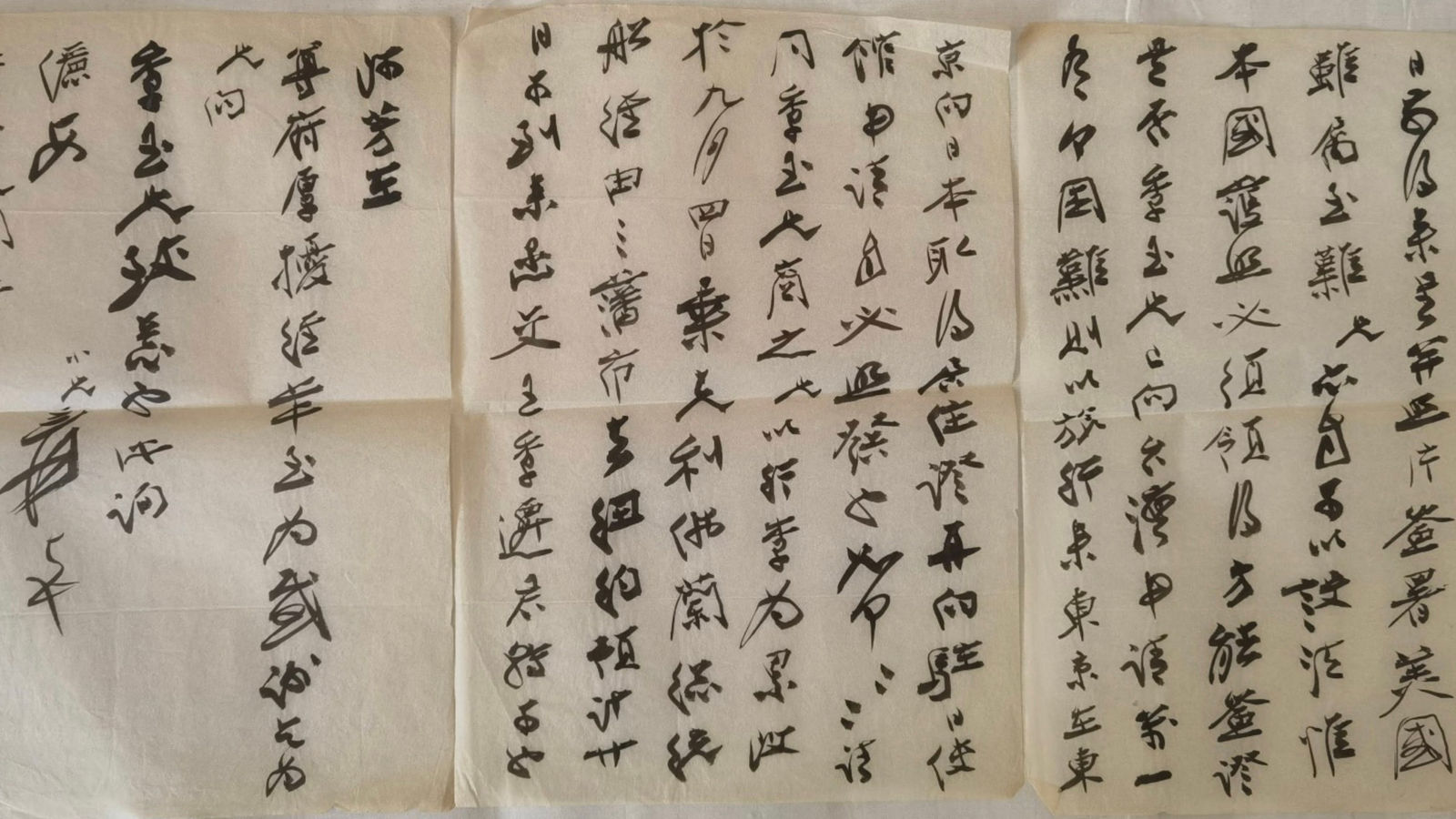-
Artworks

Zhang Daqian 張大千 1899-1983
Letter of Travelling to New Yorkink on paper 水墨纸本11 1/2 x 21 in
29.2 x 53.3 cmCopyright The ArtistLetters have long been one of the most important forms of Chinese calligraphy, embodying both artistic value and practical function. Unlike monumental inscriptions or works created specifically for display, letters...Letters have long been one of the most important forms of Chinese calligraphy, embodying both artistic value and practical function. Unlike monumental inscriptions or works created specifically for display, letters emerged from everyday communication and thus preserve the most genuine and natural forms of brushwork. Some of the earliest surviving calligraphic masterpieces are in fact private letters, such as Lu Ji’s Pingfu Tie, Wang Xun’s Boyuan Tie, and Wang Xizhi’s Sangluan Tie. Though written for immediate and personal purposes, they have become timeless classics in the history of Chinese calligraphy.
The phrase “seeing the character is like seeing the person” finds its fullest expression in letters. Depending on the content, the writer unconsciously infuses the strokes with subtle and shifting emotions—joy, sorrow, urgency, or composure—feelings that the viewer can sense through the rhythm of the brush. Because letters were generally private and not composed for public display, they rarely exhibit the deliberate polish of formal calligraphy. Instead, they offer a direct reflection of the writer’s state of mind and bodily rhythm at the moment of writing. This uncontrived authenticity is among the most treasured qualities of the art.
Zhang Daqian’s letters continue this tradition. In his correspondence, brushwork becomes a vehicle for friendship and sincerity, with his personality flowing naturally between the lines. Compared with his more deliberate compositions on large-scale scrolls, his letters reveal a relaxed, unguarded side, embodying the notion that “calligraphy is the person.” In this way, letters are not only practical instruments of communication but also among the most immediate and heartfelt expressions within the art of Shufa, allowing us to encounter the living presence of the writer through ink on paper.
信札自古以來便是中國書法最重要的表現形式之一,也是書法最具實用性的功能所在。不同於碑刻或專門的書法作品,信札源於日常交流,因此保留了最真實、最自然的筆墨形態。現今所傳最古老的墨跡,多為書信,如陸機《平復帖》、王珣《伯遠帖》、王羲之《喪亂帖》等,皆以個人書札流傳至今,卻成為中國書法史上的不朽經典。
「見字如面」正是信札的真實寫照。因應書信內容的不同,書寫者會不自覺地注入細膩而多變的情感。或喜悅、或憂懷、或急切、或從容,這些情緒隨筆尖流淌,細微之處也能被觀者感知。信札又因多屬私密,並非刻意為觀賞而作,因此少有矯飾,往往最能直接反映書者當下的心境與身體節奏。這種「不期然而然」的真實,恰是書法藝術最可貴之處。
張大千的信札延續了這一傳統。他在信中既以筆墨寄情,亦在字裡行間自然流露真誠的情誼與個人性情。相比他在大幅書法作品中更為講究的構圖與章法,信札則顯示了他放鬆而真實的一面,將「書如其人」的理念表現得淋漓盡致。這使得信札不僅是傳遞信息的工具,更成為中國書法中最能直達人心的藝術形式。
-
Inscription:
Translation: I have lately received your esteemed letter together with the enclosed photographs. To secure a visa for the United States is indeed most difficult; yet I trust, elder brother, that you will be able to devise a means. Only, it is indispensable first to obtain a national passport, without which the visa cannot be granted. I wonder whether Brother Jiyu has already submitted an application to Taiwan. Should there be any obstacle, one might travel to Tokyo: there, by securing a residence permit from the Japanese authorities and thereafter applying at the American Embassy, the visa would surely be issued. This may be considered. I beg you to consult with Brother Jiyu on this matter.
Because of the encumbrance of baggage, I have altered my plans and shall depart on the President Cleveland on September 4, traveling via San Francisco to New York, and expect to arrive about the 20th. Your future letters to me may be handed to Mr. Qiqian Wang (C. C. Wang).
During the past year Afang has been so generously received at your honored residence; I am most deeply grateful. I beg you also to convey my respects to Brother Jiyu.
With inquiries after the health and peace of you and your esteemed wife,Your younger brother, Yuan, with humble obeisance.
釋文:日前得來書並照片,簽署美國雖屬至難,兄亦自可以設法,惟本國護照必須領得,方能簽證,是否季玉兄已向台灣申請。萬一有何困難,則旅行來東京。在東京向日本取得居住證,再向駐日使館申請,自必照發也。如何如何。請同季玉兄商之。兄以行李為累,改於九月四日乘克利佛蘭總統船,經由三藩市去紐約,預計廿日可到。來函交王季遷君轉可也。阿芳在尊府厚擾經年,至為感謝。乞為兄向季玉致意也。此詢儷安。小兄爰,頓首。
25of 25
Join our mailing list
* denotes required fields
We will process the personal data you have supplied to communicate with you in accordance with our Privacy Policy. You can unsubscribe or change your preferences at any time by clicking the link in our emails.

